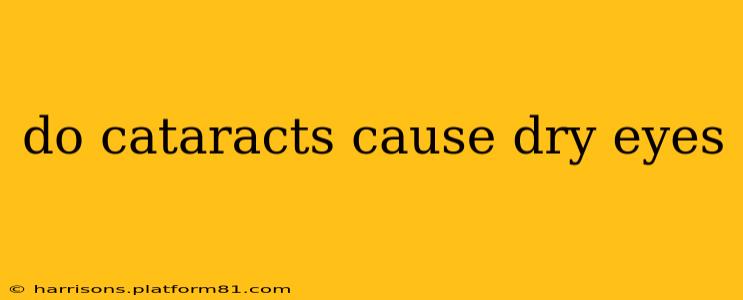Cataracts, a clouding of the eye's lens, and dry eye disease, a condition where the eyes don't produce enough tears or the tears evaporate too quickly, are both common eye problems, but they aren't directly causally linked. While they don't directly cause each other, there can be an association and overlapping symptoms that can make it tricky to diagnose. Let's explore the relationship.
Can Cataracts Lead to Dry Eye Symptoms?
It's important to understand that cataracts themselves don't directly cause dry eyes. However, some cataract symptoms might mimic those of dry eye, or the presence of cataracts can indirectly contribute to the sensation of dryness. This is because the clouded lens can affect light transmission to the retina, potentially altering the way the eyes feel and perceive their environment. Someone with cataracts might experience:
- Increased light sensitivity (photophobia): This can lead to more frequent blinking or squinting, potentially contributing to a feeling of dryness.
- Blurred vision: Poor vision can make it more challenging for someone to notice if their eyes are actually dry. They might misinterpret blurry vision as dryness.
- Reduced contrast sensitivity: This can impact the perception of visual details, possibly leading to a feeling of eye discomfort that's misinterpreted as dryness.
These symptoms can overlap with dry eye symptoms, such as:
- Burning or stinging: Both dry eyes and cataracts can cause a burning or stinging sensation.
- Itching: Similar itching can occur with both conditions.
- Foreign body sensation: Both can create a feeling of something in the eye.
Therefore, a thorough eye exam is crucial to determine the underlying cause of the discomfort.
Do Dry Eyes Increase the Risk of Cataracts?
There's no definitive evidence suggesting that dry eye disease increases the risk of developing cataracts. While both are age-related, there isn't a direct causal link established through scientific research.
How Are Dry Eyes and Cataracts Diagnosed?
Diagnosing both conditions requires a comprehensive eye examination by an ophthalmologist or optometrist. For cataracts, the doctor will assess the clarity of the lens through visual acuity tests and a thorough examination using a slit lamp. For dry eyes, the doctor may perform tests such as tear film breakup time, Schirmer's test, and assess the meibomian glands (responsible for producing the oily part of tears).
Can Cataract Surgery Help with Dry Eyes?
Cataract surgery itself doesn't treat dry eyes. However, some patients report improvement in eye comfort after cataract surgery if the blurry vision and light sensitivity caused by cataracts were contributing to their perception of dryness. The surgery corrects the underlying vision problem, potentially alleviating the associated discomfort. However, if someone has pre-existing dry eye disease, the surgery won't cure it.
What if I Experience Dry Eye Symptoms and Suspect Cataracts?
If you're experiencing symptoms suggestive of both cataracts and dry eyes, it's crucial to schedule an appointment with an eye care professional. They can accurately diagnose the underlying cause of your discomfort and recommend appropriate treatment options. Don't self-diagnose; a proper diagnosis is essential for effective management.
Disclaimer: This information is intended for general knowledge and informational purposes only, and does not constitute medical advice. It is essential to consult with a qualified healthcare professional for any health concerns or before making any decisions related to your health or treatment.
